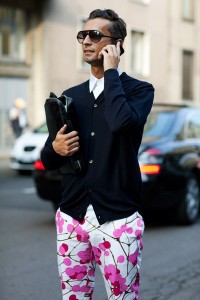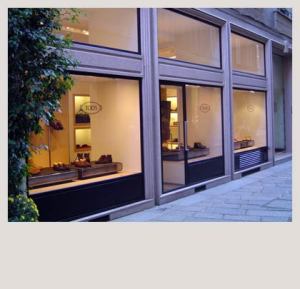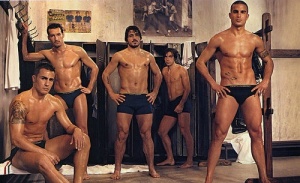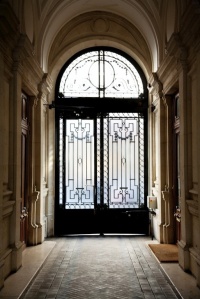Timo.
Tuesday morning she came into the studio and Timo was aflutter the minute she walked through the door.
“You got a mystery letter,” he said, waving a FedEx envelope in her face. “I figured it was business so I opened it. Two tickets to the Inter game tomorrow night! You are a sly fox.”
“Wait, let me see,” she told him.
“Third row center field!”
“Let me see it. I have no idea what you’re talking about.” Reluctantly, TImo handed her the envelope. She reached in and sure enough, there were two tickets, third row center field, to the Inter-Juventus game the next evening. Nothing else. The FedEx label said it had been sent from a shipping shop in Turin.
“Well?” Timo asked.
“Well what? You’ve seen it–no note, no return address, no name. Your guess is as good as mine.”
“Let’s see, I’m just curious. We were in Turin last week ago shooting at the stadium where Juventus plays. You yelled at a bunch of football players to get off the field during your shoot. You showed up in Milan at noon the next day. And now you get tickets to go see the best game of the season in the best seats in the arena.”
“How would you know they’re the best seats in the arena?” TImo was notoriously ignorant of all sport except when the players undressed.
Ugh, I bought tickets for my brother for Christmas last year, they were like 500 Euros. Each.” He raised one eyebrow at her and paused for effect. “But you’re stalling. Trying to change the subject.” He walked over to her computer. “Let’s think of who could have wanted to send Francie tickets to the game,” he said, opening up her web browser. “Oh look,” he said. “The Juventus roster is in your history. That makes it easy.”
“Timo! Stop!”
“And you only looked at one player…Paolo Romaldo. Nice choice.”
“Timo.” She was furious.
“I’m hurt, you didn’t tell me anything. I thought we were close,” he pouted.
“There’s nothing to tell,” she began.
“There’s always something to tell,” he wheedled. “Anyway, I knew you liked him.”
“You did not,” she said indignantly.
“Did too,” he answered. “You took a picture of him and it was on the card with the rest of the shoot.” He flipped through some files and pulled it up on the screen. “See?”
There it was, the shot she’d snapped while he was walking away across the field, shiny hair and tan legs and a hint of that magnificent ass under his shorts.
“Can you blame me?” she smiled.
Timo sat down on the couch and crossed his legs. “So? Dish.”
“I think I’d like a coffee first.”
“So go get one!” he said, gesticulating towards the espresso machine. “I’ll have one, too. No foam. Although, maybe this is a story that needs foam…”
“Enough.”
“Fine, no foam. You don’t like foam anyway.”
She stood at the Jura waiting for their coffees. “You could give me the preamble,” Timo said.
“It was like you said. I yelled at them for being on the field and interrupting us, the one guy started talking to me–”
“–Paolo,” Timo interjected, purring the name.
“Yes, Paolo,” Francesca continued. “He asked me to meet him for a drink after they were done and we went to a little cafe and had a drink–”
“What did you get?”
“A spritz. We both had spritzes.”
“That’s so cute. A spritz. That’s what I used to get when I would go out on dates in high school.”
“Do you want to hear the rest of the story?”
“I can only imagine what’s going to happen next. Maybe you’ll watch Titanic and share popcorn.”
“As a matter of fact, that’s exactly what we did.”
“I hope you two wait until you get married,” Timo squealed.
“You’ll notice I refrained from asking you about your dates in high school.”
“All older men. They thought I was worldly beyond my years for Urbe. Anyway.”
“Anyway.”
“So you had your spritz, and he had his spritz, and then you had his spritz, and then he had your spritz…”
“God, you are insufferable.”
“Oh, I”m sorry, did he spritz on you? Could he not make you spritz? Is that what happened? Please, carry on.”
Francesca was laughing so hard she was shaking. “I can’t decide if spritz is a good thing or a bad thing,” she said.
“I think it’s kind of a personal preference.”
“I’m trying to remember if we even finished our spritz,” she said vaguely. “I think we may have sped off to his apartment and left the spritz on the table.”
“What kind of a place did he take you where they let you leave spritz on the table!” They were both howling.
“The waiter knew him. I think he’d spritzed there before,” Francesca said, deadpan.
“And then he took you to his apartment.”
“Right.”
“Did he drive?” Timo asked.
“Yes.”
“What kind of car?”
“Maserati.”
“Oooh, what color?”
“Dark blue.”
“I bet he has a big penis,” Timo said. “Two door or four?”
“Relevance?”
“None, just curious.”
“Two,” Francesca answered.
“Fine. Good. Where does he live?”
“Somewhere in Turin?” Francesca answered. “I don’t know. I don’t really know the city.”
“Apartment or house?”
“Apartment. Loft.”
“Loft! I love a loft. So much light in a loft. Did you tell him you work in a loft?”
“No. It’s not really a loft.”
“I tell people we work in a loft,” Timo said. “Look around. It’s a loft. Light, airy, exposed columns. Loft.”
“His apartment was a real loft.”
“What was it like?”
“Light, airy, exposed columns,” Francesca answered. “No, really. White. Contemporary art. Extremely tidy.”
“Could you imagine yourself living there?”
“Stop it,” she said. “You’re getting way ahead of yourself.”
“I’m just trying to piece together the series of events that culminated in these ridiculous tickets being delivered to our office today.”
There was a quiet moment. “It was amazing,” Francesca said wistfully. “He knew just what I wanted. Or he wanted what I wanted. We both wanted the same thing. We just fit together, like–”
“Like a plug and an electric socket,” Timo finished.
Francesca groaned audibly.
“I’m happy for you,” Timo said.
“I didn’t think I’d hear from him again,” Francesca said.
“Well, you didn’t, not exactly. The tickets could be from his secret deranged stalker wife. She could be sitting one seat over waiting to stab you.”
“True. I suppose there’s several possibilities.”
“And we haven’t even touched on the most important question,” Timo added.
“Which is?”
“Who’s going to go with you to the game.”
“I suppose I should ask Cristiana,” Francesca said. “She loves football. And Giovanni hates it so they never go.”
“Sure, she loves football. But then you’d have to explain the whole story of how you came into possession of two amazing seats at a football game and it would be awkward for you to have to tell her a week later that you never heard from him again.”
“Hey!” Francesca glared at him.
“However, I already know the whole story so you wouldn’t have to explain anything. I would just sit next to you and wave a little flag and go home when the game was over.”
“I should probably ask my brother,” Francesca mused. “I bet he would love to go to an Inter match.”
“Your brother? He’ll never get out of the house. You know what his wife is like, if he goes anywhere she has to go with him and if she can’t go with him she has to get a babysitter so she can go out, too, so he’s not having more fun without her, and it’s too late to get a babysitter for tomorrow night. It’s too late for anything for tomorrow night,” TImo sighed. “And you’re forgetting that he might tell your mother.”
“Good point. You’re probably busy tomorrow anyway, though.”
“Nothing I couldn’t cancel,” Timo replied. “Come on, we can get Tonio to come here and do our hair together. I promise I won’t say a word.”
At least she could be sure of that. When they were together in the studio, Timo was out of control, but with anyone else, outside the studio, he was a vault.
“Be happy, Francie! This is exciting! It’s not every day the best fuck of your life turns out to be a millionaire celebrity. This is like better than Jude Law!”
Francesca raised an eyebrow. Jude Law was Timo’s ideal. “Better than Jude Law?”
“Better for you,” Timo edited.




